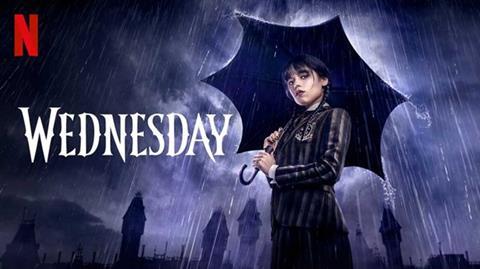Part 2 of season 2 of the Netflix hit series Wednesday is out this month - Lisa Skinner weighs up the pros and cons of watching it as a family

The show Wednesday has become the biggest success in Netflix’s history; it’s massive and there are big fans in my household, but given it includes dark and supernatural content, I’m conscious that some Christian parents might not been keen for their youth and children to watch it. So what’s it all about and what should we think about it?
For those that don’t know Wednesday is part of The Addams Family family of shows so this latest offering in, with its dark and twisted charm, is far from a new phenomenon. The Addams Family began as a comic strip created by cartoonist Charles Addams before evolving into a black-and-white television series that ran from 1964 to 1966. Many will remember the iconic theme tune with its signature double thumb clicks. The family reappeared in a 1977 telefilm, then returned to the spotlight with movies in 1991 and 1993, and again with animated films in 2019 and 2021. Yet all these earlier incarnations have arguably been eclipsed by Netflix’s recent smash-hit series centred on Wednesday Addams, brilliantly portrayed by Jenna Ortega. Produced by Tim Burton, the series leans heavily into the macabre and grotesque sensibilities he is known for. But with so much emphasis on the darkness of the Addams world, it raises the question: is this a show we should really be letting our children watch?
This series is on everyone’s lips right now, especially among our teenagers and their peers
My initial reaction to that question was, “No!” Much like the debates that surrounded Harry Potter back, many contend that parents should not permit their children to watch shows like Wednesday. After all, the Bible does say, “whatever is true, whatever is noble, whatever is right, whatever is pure, whatever is lovely, whatever is admirable—if anything is excellent or praiseworthy—think about such things.” (Philippians 4:8)
However, after watching the show for myself I came to realise that at its core, Wednesday is a tale of good versus evil. I think we do our children a disservice if we shield them from the truth that there are dark forces at work in our world, some visible, others hidden. While Wednesday might appear to take things to the extreme with its werewolves, sirens, shapeshifters, and hydes, let’s not forget that J. R. Tolkien and C. S. Lewis reverted to some fanciful storytelling as a means to communicate deeper spiritual truths. Indeed, Scripture itself speaks of demons, sorcerers, magicians, ghosts, and even dragons. Discipleship involves learning to prepare for and recognise the spiritual battles we will inevitably face. While our battles may take a different form, if we only ever show our children the good in the world, we leave them ill equipped for the challenges of walking with Jesus. Evil is real and we need to help our children understand that, alongside the truth that they should not be afraid because, “the one who is in you is greater than the one who is in the world.” (1 John 4:4)
While our battles may take a different form, if we only ever show our children the good in the world, we leave them ill equipped for the challenges of walking with Jesus
Nevertheless, it is important to note that Wednesday does carry a UK rating of 12, reflecting its elements of violence, gore, dark imagery, offensive language, and at times disturbing scenes. As a mother, I rely on these ratings, alongside my awareness of each child’s individual threshold for such content. With this in mind, I don’t believe that the majority of under 12s would have the emotional or intellectual maturity to handle the themes explored in the series. So those with tweens, tread with caution.
The plot of the first series of Wednesday is somewhat easier to follow, with the main storyline centred on Wednesday’s determination to solve a local murder mystery. In contrast, the second series introduces the growth of both familiar and new characters, the reappearance of a common enemy, and multiple subplots, which can at times make the story difficult to keep up with. Nevertheless, both series have proved undeniably binge-worthy, as reflected in the streaming figures, with viewers just as eager to see justice served as the protagonist herself.
Read more:
Christian parents should not let their children watch the new Harry Potter series
Christian parents should be fine with letting their children watch the new Harry Potter series
Stories like Harry Potter can help Christian parents aid their young people through the 3 key challenges of adolescence
Christian parents can use KPop Demon Hunters to explore the gospel
Despite her determination to repel any hint of friendship and companionship, Wednesday ultimately wins over those around her, as well as the audience, through her unwavering refusal to let others define who she is. Beneath Wednesday’s sharp, sarcastic exterior lies something deeper. We see a girl who, beneath her cold and emotionless demeanour, is fiercely driven to protect the vulnerable and the outcasts, and even when confronted by her enemy, one who demonstrates remarkable mercy. We also encounter a mother longing for connection with her daughter and unity within her family. And we see a friend willing to sacrifice everything, even her own life, for the sake of those she loves. Surely, these are themes that resonate strongly with us as Christians. Where others may see darkness, there is light streaming out of every one of these storylines.
This series is on everyone’s lips right now, especially among our teenagers and their peers. We could exclude them from watching it or embrace the opportunity to highlight biblical themes like defending the cause of the oppressed, nurturing unity, loving sacrificially and extending forgiveness. When we thoughtfully engage with modern culture, God can open doors to witness for him. Perhaps Wednesday could become just such an opportunity for us and our children.


































